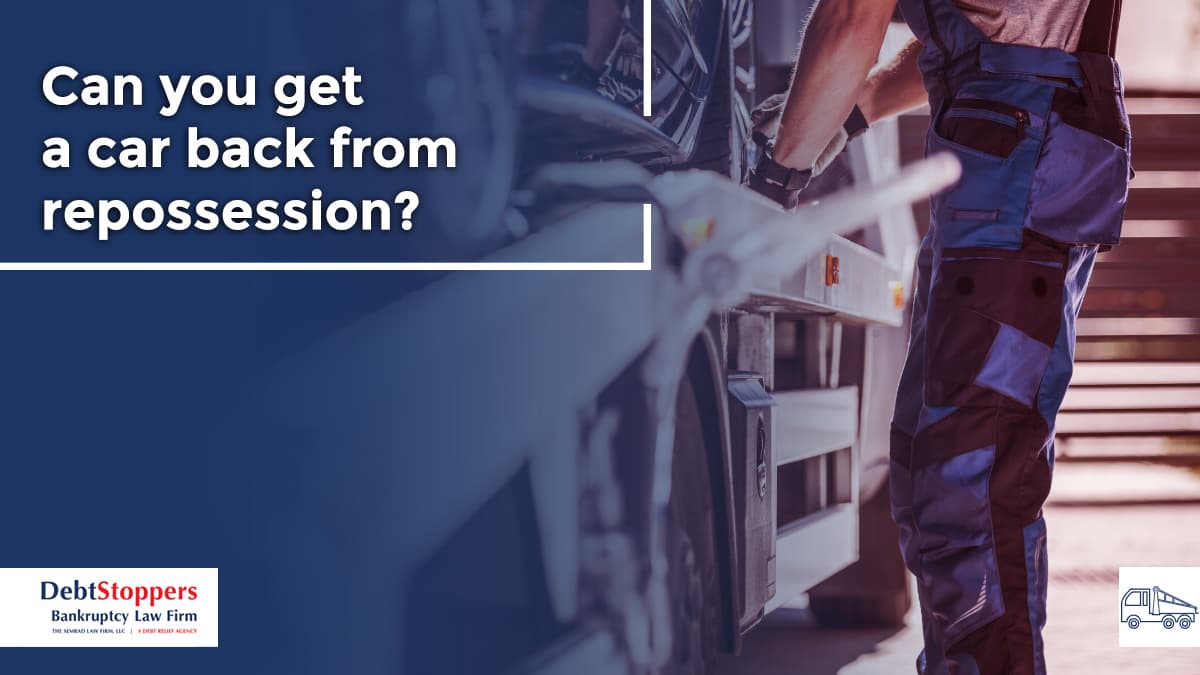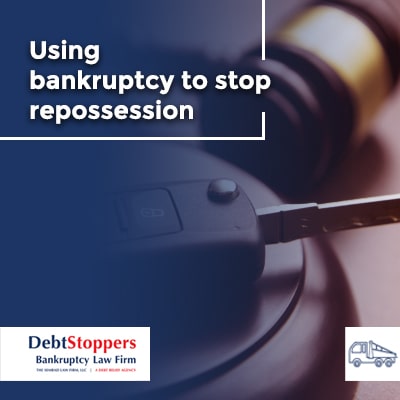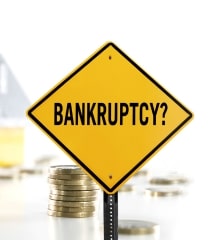Updated on 07 October 2025
Can you get a car back from repossession?

Yes, you can often get a car back after repossession, depending on your financial situation, lender policies, and state laws. This blog will tell you everything you need to know about how to get your car back from repossession.
What is car repossession?
Car repossession is a legal process that allows a lender, usually a bank or finance company, to take back a vehicle from a borrower due to missed loan payments. In most auto loan agreements, the vehicle itself serves as collateral, meaning the lender has the right to reclaim the property if the borrower defaults on payments.
When can your car get repossessed?
Repossession can happen without warning, and lenders can typically take back the car without a court order if it is allowed by the terms of the contract.
Can you get a car back from repossession?
Yes, it's possible to get a car back after repossession, but the process and options depend on the lender, state laws, and the borrower's financial situation.
Each option has potential fees, and acting quickly is essential because lenders can sell a repossessed vehicle fairly quickly to recover their losses.
Redeem your car by paying off your loan
Redemption allows the borrower to pay off the remaining balance of the loan in full, including any repossession and storage fees. This is often a more challenging option because it requires a significant lump sum.
Reinstatement of the loan
Reinstatement allows the borrower to pay the overdue amount, along with any associated fees, to bring the loan current.
Once the loan is reinstated, the borrower can regain possession of the car. This option is not always available, but some lenders offer it as a one-time opportunity.
Negotiate with the lender
Many lenders are open to negotiating with you or your attorney.Lenders may be open to negotiating a repayment plan or modifying loan terms to help the borrower get the vehicle back. This might involve restructuring the loan or extending payment deadlines.
How to get your car back after repo: Step-by-step
The first thing to know is that once your car has been repossessed, you have limited time, so it’s important to understand your options and act quickly.
If you have already paid a significant portion of the total loan, you may have a limited amount of time to reinstate the loan. To reinstate the loan, you’ll be required to catch up on any missed payments and fees, and you will then be able to resume making your payments according to the original loan agreement.
You may also have the ability to redeem your car before it is sold at auction. However, in order to redeem your car, you must be able to pay the entire loan balance and fees. If you have the money to buy the vehicle, this can be a good option, but it is typically unaffordable for most people.
Alternatively, if you are unable to reinstate your loan or redeem your car, you may be able to purchase the car at auction. However, it’s important to know that if the sale of the vehicle at auction does not cover the balance of the loan, you may still be responsible for paying the deficiency balance.
Another option is to file bankruptcy. When you file bankruptcy, an automatic stay goes into effect, which can halt the repossession and prevent any further collection actions from being taken against you. Most people who file bankruptcy are able to keep their car by utilizing state and federal exemptions.
Is bankruptcy a cheaper option than car redemption to keep your vehicle?
In most cases, if you want to keep your vehicle, it’s cheaper to file bankruptcy than to redeem the car following a repossession. This can be especially true if you owe more than the car is worth. If you owe more than your car is worth, a Chapter 13 bankruptcy will let you “cramdown” the loan to the current value of the car and can save you a significant amount of money.
In the short term, bankruptcy is typically cheaper than redeeming the vehicle. To redeem the vehicle after a repossession, you must act quickly and be able to pay the entire balance of the loan and all applicable fees.
However, if you file bankruptcy, an automatic stay is triggered, which immediately stops the car from being repossessed. Bankruptcy also gives you the ability to reorganize or discharge your other debts while keeping your vehicle.
How much does it cost to get a car back after repo?
Getting your car back after a repossession is not cheap. However, the exact amount depends on what option you selected to get your car back.
For example, if you choose to redeem the vehicle, you will be required to pay the full balance of the loan and fees. In effect, you are purchasing the vehicle. You will also be required to pay any fees and costs associated with the repossession, such as towing and storage.
On the other hand, if you reinstate your loan, you will be required to pay any payments you missed and all fees. Alternatively, if you attempt to buy the vehicle at auction, you would pay the auction price and could still be responsible for paying a deficiency balance to the lender.

Using bankruptcy to stop repossession
Filing for bankruptcy immediately halts the repossession process and provides an opportunity to include the car loan in a bankruptcy. However, bankruptcy can be complex and typically requires legal advice.
Chapter 7
Filing for Chapter 7 triggers an "automatic stay," which temporarily stops creditors from repossessing the vehicle or pursuing collections. Many states allow debtors to protect a certain amount of vehicle equity using exemptions. If your car’s value (minus what you owe) falls within the allowable exemption, you may keep it as long as you continue making payments. If your equity is more than the exemption limit, the trustee may sell the vehicle, pay off the loan, and use the remaining funds to pay creditors.
If you owe money on the car but want to keep it, you can sign a reaffirmation agreement with the lender. This agreement confirms that you’ll continue paying off the loan even after the bankruptcy discharge, allowing you to keep the car but making you responsible for the debt. If the car’s market value is less than what you owe, Chapter 7 allows you to “redeem” the vehicle by paying its current value as a lump sum. This can be challenging since it requires paying the entire amount upfront, but it’s a way to potentially keep the car and pay less than the loan balance.
If you can’t or don’t want to keep the car, you can surrender it to the lender, which cancels your obligation to repay the loan under Chapter 7. This can be a way to clear the debt if the payments are unaffordable, but it does mean giving up the vehicle.
Since bankruptcy laws and exemptions vary by state, it is wise to work with a bankruptcy attorney to explore the best strategy for keeping your vehicle.
Chapter 13
Similar to Chapter 7, filing for Chapter 13 initiates an automatic stay that prevents repossession or collection actions while the bankruptcy case is ongoing.
In Chapter 13, debts are reorganized into a repayment plan, typically lasting three to five years. You can include past-due car payments in this plan, allowing you to catch up over time without facing repossession as long as you stick to the plan.
If the car loan is older than 910 days at the time of filing, you may be eligible for a "cramdown." A cramdown allows you to reduce the loan balance to the vehicle’s current market value, meaning you only pay back what the car is worth rather than the total amount of the loan. This can lower monthly payments significantly.
Chapter 13 may allow you to adjust the interest rate on your car loan to a more favorable rate, especially if your current rate is high. This can reduce the overall cost of the loan and your monthly payments.
In Chapter 13, exemptions are less critical than in Chapter 7 because you typically aren’t at risk of losing assets. As long as the repayment plan includes your vehicle loan and you adhere to the payment terms, you are allowed to keep the car.
Alternatively, if you can’t afford to keep the car, Chapter 13 also provides the option to surrender the vehicle, removing the loan from your repayment plan. You won’t have to pay any remaining balance on the loan as it’s discharged with other debts in the bankruptcy.
Since Chapter 13 allows for a structured repayment of arrears and adjustments to loan terms, it can be a viable option for people who want to keep their vehicle but are struggling with high payments or delinquent balances.

How can Debtstoppers help you with stopping car repossession?
The experienced bankruptcy attorneys at Debstoppers can be instrumental in stopping a car repossession by guiding you through all the options available under bankruptcy law.
Based on your financial situation and goals, an experienced bankrutpcy attorney can advise whether Chapter 7 or Chapter 13 is best for stopping repossession. Additionally, bankruptcy attorneys are skilled negotiators and often have relationships with creditors. They may be able to negotiate a reaffirmation agreement, a more manageable payment plan, or other options that allow you to keep the car.
If you’re filing for bankruptcy, an attorney can guide you every step of the way. Filing for bankruptcy is a complex process that requires legal expertise to ensure it’s handled correctly.
For example, an experienced attorney knows the exemptions available in your state and can help protect your car’s equity, allowing you to keep the vehicle when possible, especially under Chapter 7. In Chapter 13, an attorney will help structure a repayment plan that fits your budget and includes past-due car payments. This plan can allow you to catch up on missed payments over three to five years while keeping the car.
With Debtstoppers' history and in-depth knowledge of bankruptcy laws, our attorneys provide essential guidance, legal protection, and support throughout the process, ensuring you’re using every available tool to stop repossession and protect your vehicle.
What mistakes to avoid when pursuing car redemption after repossession?
The primary mistake people make when pursuing car redemption after repossession is not failing to act quickly. Once your car has been repossessed, time is ticking - once your car is sold at auction, it's gone. Not only is it gone, but you may still be responsible for paying for the deficiency balance.
You should also know that you may have additional options, including reinstating the loan, re-negotiating the loan, and filing bankruptcy.





